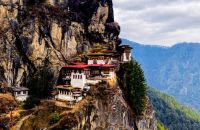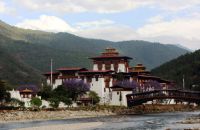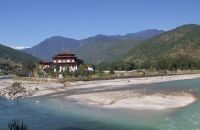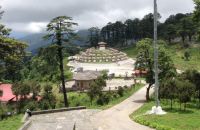Talk with our local travel specialist who can help organize your trip.
Top ten tips for planning a trip to Bhutan
With its lush, green hillsides, thick tangled forests, unique fortress-like monasteries (known as dzongs), and strong Buddhist beliefs all overlaid with a heavy coat of myth and legend, the Himalayan kingdom of Bhutan is a dream holiday destination for many. But, visiting Bhutan is not as simple as merely packing a bag and hopping on a plane.
The team here at Third Rock Adventures have spent weeks exploring all four corners of this unique country and, having organized countless holidays to Bhutan, we are real experts in the country. We’ve compiled a list of eleven top tips that anyone considering visiting Bhutan needs to know before they go.
Table of Content
- The Sustainable Development Fee
- Organising A Tour To Bhutan
- Plan Your Trip To Bhutan Well In Advance
- Where To Stay In Bhutan: Homestays
- Where To Stay In Bhutan: Luxury Boutique
- Keep Some Cash Handy
- Familiarize Yourself With Bhutan's Festivals
- Respect Local Customs And Culture
- Respect The Environment
- Be Mindful Of Photography Restrictions
- Understand Bhutan's Political System
- Conclusion
1. The Sustainable Development Fee
One of the most important top tips that anyone planning a holiday to Bhutan needs to know concerns the sustainable development fee. Bhutan has a ‘high value, low impact’ approach to tourism. Essentially this means getting the most financial benefit from tourists while minimizing the environmental and cultural impact that tourism can have. And who can fault them for that! To do this all visitors to Bhutan must pay a fixed, daily fee to the government which goes toward funding Bhutan’s free education and healthcare systems, and environmental projects. In the last few years, the fee (sometimes called a royalty tax or sustainable development fee) has changed several times. Prior to the Covid 19 pandemic, it was set at US $65 per day/adult.
When the country re-opened after the pandemic the fee increased to US $200 per day/adult. However, due to pushback from the tourism sector, in 2023 the government announced that the fee would be reduced to US $100 per day/adult. For children between the ages of six and 12, it’s US $50 per day and for those under six, there’s no charge. These fees are in addition to the cost of the actual tour and the visa (which is US $40 per person). Virtually every tour company (including Third Rock Adventures) includes these fees in the overall tour cost.
2. Organising a tour to Bhutan
You may have heard it said that Bhutan only allows a limited number of people to enter the country each year. This is a miscaption, and there is no restriction on the number of arrivals put forth by the government. But another important top tip for planning a trip to Bhutan is to know that traveling to Bhutan is not like traveling anywhere else. Visitors need a guide or tour company services while traveling in Bhutan. Foreign visitors to Bhutan can only travel around the country in a private vehicle provided by a registered tour company or by plane. In addition to the guide, all vehicles also come with a driver. Beyond this though you are free to devise your own itinerary and select your own hotels.
Most people visiting Bhutan though find it easiest to either choose an off-the-peg itinerary offered by an experienced tour company such as Third Rock Adventures (we offer over 40 readymade tours and treks across the length and breadth of Bhutan) or, by working alongside your chosen tour company, you can design an itinerary yourself. We especially recommend this if you have specialist interests. Once on the ground in Bhutan, there’s often a little bit of leeway with your itinerary. This means that if, for example, you hear about an interesting monastery in a side valley then it’s generally no problem taking a visit on
3. Plan your trip to Bhutan well in advance
Perhaps the most important of our eleven top tips for planning a trip to Bhutan is to get down to that planning well in advance of your intended date of departure. Organizing the tour and paying all the fees takes time. Once the itinerary is settled your tour company will submit your visa fees and sustainable development fees to the Bhutanese authorities who will then grant you a visa. You should allow a minimum of one month to get all this done.
The high season for tourism in Bhutan is October and November and March and April. At these times of year, hotels are often booked up well in advance. Also, many tour companies are unlikely to have guides and vehicles available for last-minute bookings. So, if you’re planning on visiting Bhutan in these months then start planning your trip to Bhutan six months in advance. There are also only a very limited number of flights into Bhutan and so you also need to ask your tour company to book these as far in advance as possible.
4. Where to stay in Bhutan: Homestays
When planning a trip to Bhutan an important tip is to consider the kind of accommodation you wish to stay in. Most tour companies will have their preferred hotels to work with and, in general, these are high-quality establishments of at least three stars. At Third Rock Adventures we have first-hand knowledge of all the accommodations we use. For many years tourists were obliged to stay in hotels with a minimum of three stars unless there was no alternative. Since 2022 though, that has no longer been the case and tourists are allowed to choose their own hotels (although many budget hotels still won’t accept foreigners). The standard mid-range hotels used on most tours are often family-run and offer a good level of comfort.
There will be reliable hot water, some form of winter heating, decent wi-fi, and tasty meals available. But, Bhutan offers two other kinds of tourist accommodation that you really should try and take advantage of. The first are homestays. Throughout rural areas of the country (so that’s most of Bhutan!) homestay accommodation is widely available. Often these are in century-old traditional wood beam farmhouses.
The rooms are often fairly basic, with just some mattresses on the floor and a pile of thick blankets. There will only be one bathroom, which might be outside in the garden, and it will be used by both you and the host family. Hot water is far from guaranteed. And talking of heat. In winter these farmhouses can get very cold and the only form of heating is often found only in the dining room. But, despite the basic conditions, these places offer a chance to learn about Bhutanese life that you absolutely should not miss. In the evening your host family will cook up a superb feast made from local produce (often straight from the garden) and you’ll all sit around eating and chatting together. They may even let you help with preparing the meal. If you want to include a homestay in your holiday to Bhutan, we can arrange this throughout the country.
5. Where to stay in Bhutan: Luxury boutique
At completely the opposite end of the scale from a homestay is one of Bhutan’s growing numbers of absolutely stunning luxury boutique hotels. Some of these are among the best places to stay in all of Asia. Virtually all are very intimate affairs with just a handful of rooms and a high staff/guest ratio meaning impeccable service is the norm. All blend beautifully into their setting and are conveniently scattered across most of the country (the far east of Bhutan, which receives a much lower number of tourists, being about the only exception). During a stay at one of these places, you can expect to be utterly pampered. There will be superb food, great in-house guiding (if required) and virtually all also offer luxury versions of the Bhutanese hot stone bath. Rooms and common spaces will be liberally be decked in classy local arts, crafts, and antiques. The nice thing about all of these top-end places is that they aren’t sterile, ‘could be anywhere’ international cookie-cutter hotels.
They’re integrated into the community and feel totally Bhutanese. Most also work with the local population on community and environmental projects, so you can be sure your stay is giving something back to your host community. Yes, these places are, invariably, very expensive (think several hundred US dollars a night), but they are worth it if you can afford them. A great top tip for anyone spending time in Bhutan is to vary your accommodation style. We suggest doing some nights in homestays, some in standard tourist hotels, and at least a couple of nights in one of these luxury boutique offerings. Our team have first-hand knowledge of Bhutan’s luxury boutique hotels and can help you choose ones that are right for you.
Featured Trips
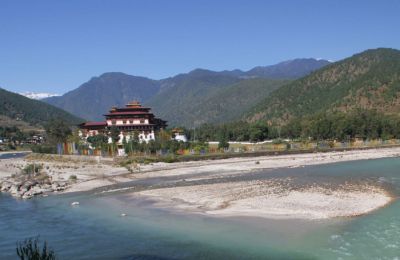
Bhutan Cultural Tour - 5 days
Bhutan Cultural Tour of 5 days lets you discover the rich Bhutanese culture. Visit ancient fortresses and Taktsang Monastery. Enjoy traditional hot stone bath.
Inquire Now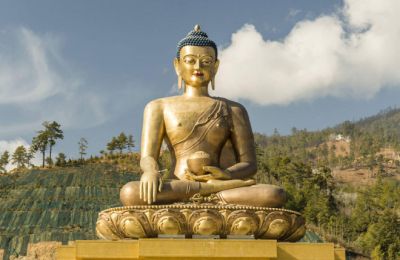
Bhutan Heritage Tour - 8 days
Bhutan Heritage Tour lets you explore centuries-old dzongs and Lakhangs built by Bhutanese kings and spiritual leaders. Take this Bhutan Heritage Tour and journey across the cultural hotspots of Bhutan, a fascinating Himalayan kingdom.
Inquire Now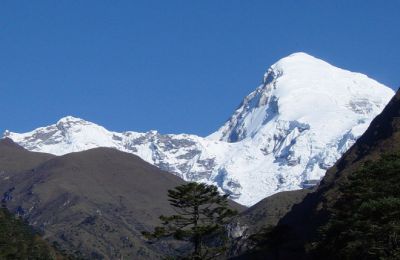
Jomolhari Trek - 11 days
Jomolhari Trek offers a taste of the great variety of Bhutanese landscapes and the most enchanting adventure trek in Bhutan. Jomolhari is the second-highest unclimbed mountain in Bhutan.
Inquire NowWhere to travel next?
Get help from our travel specialists for holiday ideas that matches your interests.
6. Keep some cash handy
The cost of a tour to Bhutan invariably includes all hotels, transport costs, guiding fees, meals, and entry fees. This means that once you enter the country, you’re unlikely to spend very much money. But, there are some items that aren’t included in standard tour fees. You will need some Bhutanese currency (which is called the Bhutanese ngultrum) for tips for guides and drivers, buying a local sim card for your phone, any souvenirs you buy, alcoholic drinks, laundry, and any items of a personal nature.
7. Familiarize Yourself with Bhutan's Festivals
One of the big cultural attractions of Bhutan is the packed festival calendar. Whether religious or secular barely a week goes by without a festival taking place somewhere in Bhutan and one of our top tips for ensuring a memorable Bhutan holiday is to include a day at one of these festivals. By far the most famous–and for many visitors one of the prime reasons for visiting the country in the first place–are the numerous monastery festivals known as tshechu. Held in the monasteries of each district (or dzongkhag) of Bhutan on the tenth day of a month of the Tibetan lunar calendar,tshechu’s are pretty much the cornerstone of traditional Bhutanese life. Focused on tightly choreographed, masked dances these are a sacred rite of passage which communicate the teachings, legends, and history of Buddhism, Bhutan, and the many saints who are so important to the Bhutanese. You might not understand much of what is being transmitted through the dances but you’ll be as spellbound as the huge local audience by the colour and pageantry of it all.
But not all of Bhutan’s festivals are religious in character. Some, such as the black-necked crane festival, which is held in the beautiful Phobjikha Valley, celebrates the annual arrival of these rare birds. Another memorable example of a festival that’s secular in character is the nomad festival, which is held in the Bumthang Valley and celebrates Bhutan’s rich nomadic culture.
With festivals being such a key part of Bhutanese life it’s worth researching what’s taking place when you plan to visit and building it into your itinerary. Be aware that big festivals, such as the tshechu’s in Paro and Thimphu, are very popular tourist attractions. Accommodation will be booked up months in advance, so you’ll need to plan your trip to Bhutan extra early. We can advise what’s happening, when, and where as well as arrange visits to some of the quieter tshechu’s where other tourists are rare.
8. Respect Local Customs and Culture
Top tips for visiting Bhutan don’t just focus on the practicalities of a visit. You should think about theculture you’re about to be immersed into as well. The Bhutanese are very proud of their unique culture and heritage. So much so that the government places enormous effort on ensuring the nation's cultural heritage is nurtured and encouraged. It’s one of the fundamental points of the famous Gross National Happiness policy of the country. You will see more people in traditional dress here than almost anywhere else in Asia, and belief and trust in the old ways of doing things is almost universal.
Because of this everyone from the government downwards is very insistent that visitors lucky enough to spend time in Bhutan are respectful of local customs and culture. Not just is this simply polite but, by researching the local culture, customs, and history before you arrive you will understand more of what you see and get much more out of your visit. It’s especially important to get a grasp of some of the myths and legends that play such an important role in the national psyche.
For a non-Bhutanese person, some of these legends might sound like mere fairy tales, but for many Bhutanese, they continue to be an unquestionable part of the nation’s history and cultural makeup. So, it’s vitally important that you don’t dismiss them in front of your new Bhutanese friends. There are some fantastic books threaded around Bhutanese history and culture that you should make the effort to read before your trip to Bhutan, as well as some comprehensive websites. We will be happy to direct you to some when you book a Bhutan tour with us.
Featured Trips

Bhutan Cultural Tour - 5 days
Bhutan Cultural Tour of 5 days lets you discover the rich Bhutanese culture. Visit ancient fortresses and Taktsang Monastery. Enjoy traditional hot stone bath.
Inquire Now
Bhutan Heritage Tour - 8 days
Bhutan Heritage Tour lets you explore centuries-old dzongs and Lakhangs built by Bhutanese kings and spiritual leaders. Take this Bhutan Heritage Tour and journey across the cultural hotspots of Bhutan, a fascinating Himalayan kingdom.
Inquire NowWhere to travel next?
Get help from our travel specialists for holiday ideas that matches your interests.
9. Respect the Environment
As important as respecting the culture of Bhutan is respecting the environment. Bhutan is a tiny, and relatively poor, country but its environmental policy leaves far richer countries in the shadows. The constitution of Bhutan states that 60 percent of its land must remain forested. The country has easily surpassed this goal though.
In addition, more than 51 percent of the country is under some form of official protection, which is more than any other country in Asia. All this means that Bhutan is not just carbon neutral, but is the first country on Earth to be carbon negative! And because of the work and sacrifices the Bhutanese have put into making their country a clean and green example to the rest of the planet they expect their guests to respect the environment.
That means absolutely no littering, no single-use plastic, always sticking to footpaths when hiking, and no picking of plants. Remember the refrain‘Take nothing but pictures, leave nothing but footprints and as you travel around Bhutan keep this thought in your mind at all times.
10. Be Mindful of Photography Restrictions
Bhutan is a wonderfully photogenic country and there are few restrictions on photography bar the normal rules about not photographing military or police. The friendly Bhutanese people are generally very happy to be photographed, but as anywhere it’s polite to ask first. The one photography restriction that does impact tourists though is the ban on taking photos in monasteries, nunneries, and any public alter rooms. But, all is not lost, because photography in the courtyards and of the exterior of these buildings is always allowed, as is photography at Tshechu’s.
11. Understand Bhutan's Political System
Bhutan's political system is a constitutional monarchy. The country transitioned from an absolute monarchy to a constitutional monarchy in 2008. The King of Bhutan, known as the Druk Gyalpo, serves as the head of state, while the government is headed by the Prime Minister, who is the leader of the ruling party in the National Assembly. Bhutan's parliament is bicameral, consisting of the National Assembly (lower house) and the National Council (upper house). The National Assembly members are elected by the people, while the National Council members include both elected and appointed representatives. Bhutan's political landscape emphasizes Gross National Happiness (GNH) as a central development philosophy, prioritizing the well-being of its citizens over mere economic growth.
Conclusion
As you will now understand, tourism in Bhutan is not like anywhere else. But, by using a quality tour company and sticking with these eleven top tips, a trip to Bhutan is something you can easily turn from dream to reality!
- Written by: Naba Raj Amgai
Updated: Jul, 23, 2024









